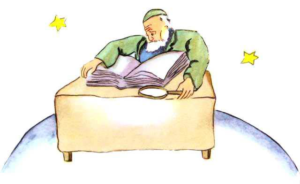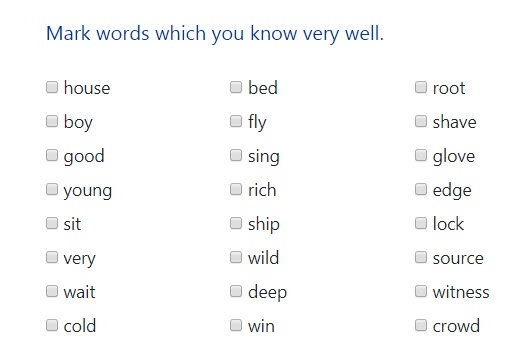CHAPTER 16 – GEOGRAPHER
Chapter 16
The sixth planet was ten times bigger than the last planet. The little prince saw an old gentleman who wrote big books.

“Oh, here comes an explorer,” he said when he saw the little prince.
The little prince sat down on the table and he was breathing fast. He was tired from travelling so much and so far.
“Where do you come from?” the old gentleman asked him.
“What’s that big book?” said the little prince. “What are you doing here?”
“I am a geographer,” the old gentleman answered.
“What’s a geographer?”
“A geographer is a scientist who knows where the seas are, and rivers, cities, mountains and deserts.”
“That’s very interesting,” said the little prince. “Finally here is a man who has a real job,” he thought. And he looked around at the geographer’s planet. The planet was amazing.
“Your planet is very beautiful,” he said. “Does it have any oceans?”
“I can’t say,” said the geographer.
“Ah!” the little prince was disappointed. “And mountains?”
“I can’t say,” said the geographer.
“And cities and rivers and deserts?”
“I can’t tell you that,” said the geographer.
“But you are a geographer!”
“That’s true,” said the geographer, “but I’m not an explorer. There’s no explorer on my planet. The geographer doesn’t discover cities, rivers, mountains, seas, oceans and deserts. The geographer doesn’t have time for travelling. He doesn’t leave his office. But the explorers visit him there. He asks them questions and he writes what they remember. And if the information of the explorer is interesting to him, then the geographer has to find out if the explorer is an honest person.”
“Why?”
“Because an explorer who lies can give incorrect information. And also an explorer who drinks too much.”
“Why?” asked the little prince.
“Because drunk people see double. Then the geographer can write two mountains in a place where there is only one.”
“I know somebody,” said the little prince,” who could be a bad explorer.
“It’s possible. So when the explorer is an honest person, then I have to check if his discovery is correct.”
“Do you visit the place?”
“No. That’s too complicated. But the explorer has to give me proof. For example, if the discovery is a large mountain, the explorer has to bring large stones from it.”
The geographer suddenly smiled. “But you come from far away! You’re an explorer! You must describe your planet for me!”
And the geographer opened his big book and prepared his pencil. I write explorers’ words first in pencil. Ink is used only after there is a proof of their words.
“Well?” said the geographer.
“Oh, where I live,” said the little prince,” it’s not very interesting. It’s very small. I have three volcanoes. Two volcanoes are active, and one volcano isn’t active. But you never know.”
“You never know,” said the geographer.
“I also have a flower.”
“We don’t record flowers,” said the geographer.
“Why not? The flower is the most beautiful thing on my planet!”
“Because flowers don’t live very long. In geography we have very exact books. They are almost always true. A mountain usually doesn’t change its position. An ocean usually doesn’t lose its water. We write about things which are here for a long time.”
“But volcanoes which aren’t active can be active again,” said the little prince.
“If volcanoes are active or not, it is the same for us,” said the geographer. “What matters to us is the mountain. That doesn’t change. Your flower is different. It can disappear soon.”
“My flower can disappear soon?”
“Of course.”
“My flower can disappear soon,” thought the little prince, “and she has only four thorns to defend herself against the world! And I left her alone!”
That was the first time when he regretted leaving his planet. But he took his courage again. “What is an interesting place to visit?” he asked.
“The planet Earth,” the geographer answered. “It has a good reputation.”
And the little prince continued on his way. He was still thinking about his flower.

